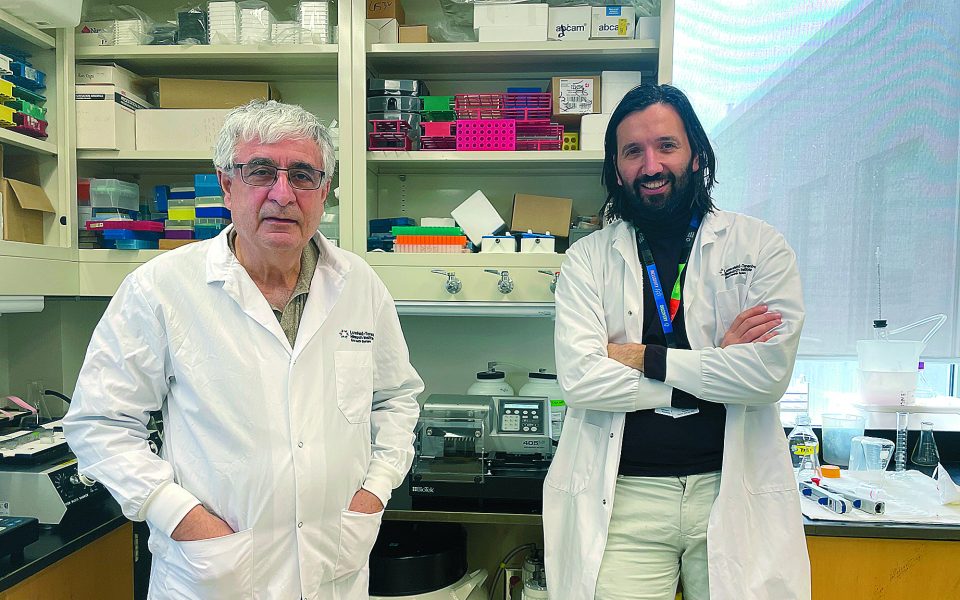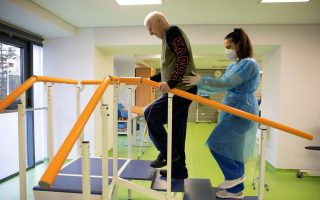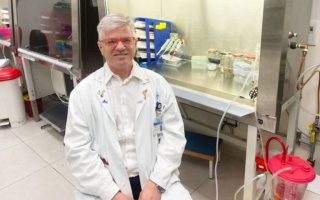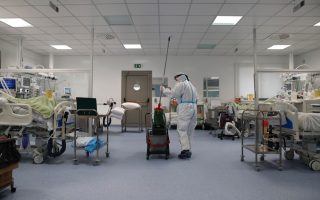High precision Covid-19 tests by Greeks in Canada

A team of Greek researchers at the Lunenfeld-Tanenbaum Research Institute in Toronto, Canada, have developed an easy-to-use diagnostic test for Covid-19, suitable for testing large numbers of people, such as students, industrial workers and nursing home workers.
“Diagnostic tests have not attracted the interest of the scientific community, which has invested its full potential in the development of vaccines to address the pandemic,” Dr Ioannis Prassas, a molecular biologist and staff scientist at Mount Sinai Hospital, told Kathimerini from Toronto. “So we still have a gap in information about the spread of the virus, which would be very helpful in formulating prevention policies.”
Prassas and Professor Eleftherios Diamandis, head of the Department of Pathology and Laboratory Medicine at Mount Sinai Hospital and the Department of Laboratory Medicine and Pathobiology at the University of Toronto, along with the latter’s team, have developed a test that presents many comparative advantages, including the fact that the tests are conducted using saliva.
The Greek scientists based the innovative test on the detection of a coronavirus protein, the nucleocapsid, which is analyzed using the enzyme-linked immunosorbent assay – or ELISA – technique to detect the presence of antigens in biological samples. This enables them to detect nucleocapsid proteins in very small trace amounts, such as 0.1 pg per cubic centimeter.
“Obtaining a nasopharyngeal smear is an unpleasant procedure in which specialized health personnel have to be involved,” says Dr Diamandis. “By contrast, the saliva sample is provided by each person alone, simply by spitting into a tube, without requiring a specialist.” At the same time, “it is a safer practice in terms of the dynamics of virus transmission during the test.”
The team believe that saliva is just as reliable for diagnosing the virus as a nasopharyngeal smear, but only if the diagnostic method is highly sensitive.
“Most commercial rapid tests have comparatively lower sensitivity and would give saliva several false negative results,” he adds. “The sensitivity of our test is 500 times higher than that of rapid antigen tests, which are very effective only for those who have a relatively high viral load at the time. That is why they can, under the right conditions, be excellent epidemiological tools for public health, but they are not as reliable for a clinical diagnosis.”
On the other hand, the polymerase chain reaction (PCR) test, although reliable in detecting the virus, presents a large window of positivity. “It can continue to test positive even after the contagious period of the disease.”
Part of the current clinical trial of the new test is to test whether, “thanks to the more limited kinetic expression of viral antigens in saliva, those who test positive will be more likely to be contagious at the time.” The tests will be conducted in special laboratories set up in factories or schools, as well as in mobile labs in vans. The results will come out in three to four hours; however, the team is working feverishly so that this time can be cut to one hour.
“Thus, each testing machine, which will be the size of a printer, will be able to analyze 5,000 to 10,000 samples in a day,” says Prassas. The test subjects will receive the results on their mobile phones via a special app, and in the future they will be able to send their sample by post for analysis – since Canada Post has successfully passed the “crash test” in the timely delivery of biological material for various types of microbiological analyses in less than 12 hours, despite the large size of the country.
The second clinical evaluation of the test (in over 1,000 saliva samples from patients with Covid-19) is under way in collaboration with Mount Sinai Hospital and is expected to be completed by the end of March, while licensing the test for the Canadian market is expected to be completed as of May 1. However, the test is not likely to reach Europe.
The same machine, however, offers an equally valuable feature: It can detect the presence of three different antibodies to the novel coronavirus. “In the coming months, this will be the challenge,” says Prassas. “We believe that the time has come for an individualized approach to our fight against the coronavirus. It is important to know the immune profile of each individual and, based on this, to regulate the tests, the person’s vaccination and the lifestyle that suits them (for example, telework) until the pandemic is over,” he adds.
“A year ago, when the pandemic broke out, we started studying biomarkers which could tell us who will get seriously ill from the novel coronavirus and who will have mild symptoms,” Diamandis tells Kathimerini.
In his long career, Diamandis has worked with breast and ovarian cancer, male infertility and Alzheimer’s. The research team, consisting of many Greek researchers and doctoral students, looked for the biological factors that help some people recover in a few weeks and others in months, while also dealing with the long-term consequences of the infection.
“At first we thought the side effects were directly related to the severity of the symptoms during the infection, but gradually we, like other scientists around the world, found that there was no link,” says Prassas. “Ultimately, it’s each organism’s immune system that plays a decisive role.” Infection with the virus can trigger autoimmune diseases, as the body’s defenses are significantly weakened. “The virus has a strong potential and causes systemic and extensive inflammation that affects many systems of the human body, such as neurological and cardiovascular,” he explains.
Therefore, the long-term consequences of the pandemic will be the field of study in the coming months for scientists around the world. Already, publications in scientific journals report that one in seven patients who have recovered from the infection continue to face serious health issues afterward.





